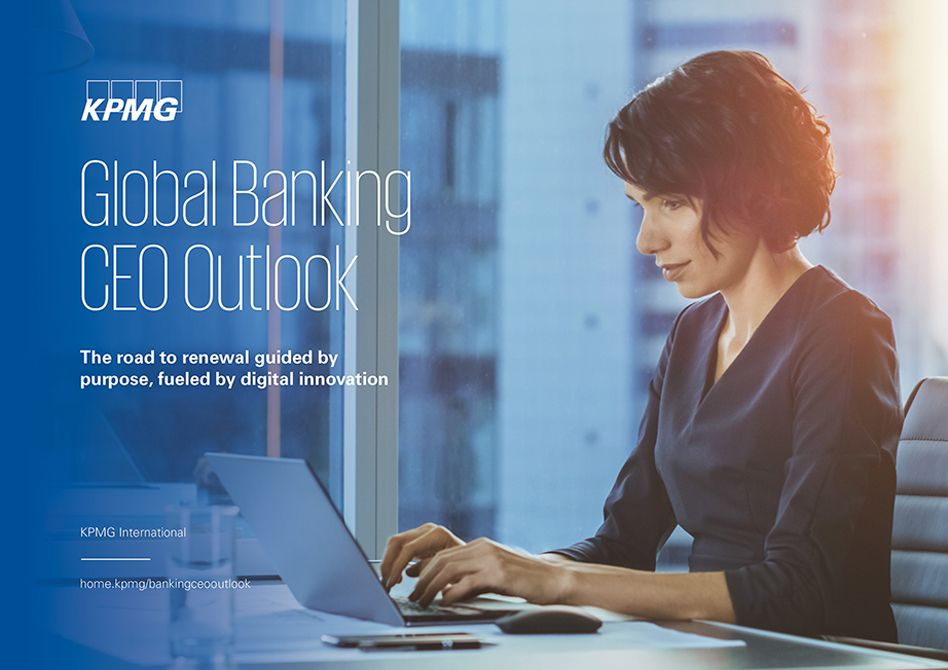The pandemic has forever changed the way financial service institutions do business. Of the 135 bank CEOs surveyed for KPMG’s annual Global CEO Outlook, we found there’s a pervasive optimism driven by a focus on innovation and a strong connection to organizational purpose. This report offers a lens on how today’s connected bank CEOs are plugged-in, people-first and purpose-led.
The road to renewal
With economies on their path back to normal, bank CEOs’ confidence levels have remained consistent compared with 2020. They’re optimistic about the growth prospects of their businesses and integrating their purpose and values into business strategies. As they look forward, a key focus will be embedding this purpose into the fabric of their organizations and, in return, providing long-term value to customers, employees and stakeholders.
A renewed sense of purpose
A majority of bank CEOs have reevaluated their purpose to better address the needs of their stakeholders. Over the next three years, 89 percent of bank CEOs see purpose as having the greatest impact on capital allocation, partnerships and merger and acquisition (M&A) strategy, followed by driving shareholder return (both 84 percent), brand reputation and financial performance (both 83 percent).
Despite continued uncertainty, most banks CEOs (88 percent) are confident about the growth prospects of their organizations. This growth is expected to continue, with 75 percent optimistic about the growth of the banking industry in the next three years. Yet, they are less optimistic for the global economy.
Economic outlook (over next three years)

Engagement with employees
The need for stability is vital in this uncertain environment. Sixty-four percent of CEOs believe that their objective is to create long-term value for stakeholders — an increase from 55 percent in 2020. They identified their employee value proposition as the priority to achieve their growth objectives and are looking to invest in upskilling employees, addressing their well-being and building a culture where they’re engaged, and flexible working is encouraged.
CEOs identified their employee value proposition as the priority to achieve their growth objectives. They’re willing to invest in upskilling employees, their well-being and building a culture where they’re engaged, and flexible working is encouraged.
Success factors to ensure employees are engaged, motivated and productive

Strategies for growth
As bank CEOs look to react quickly to how markets have changed — particularly digital driven changes in consumer preferences — they believe that their inorganic strategies will be key to achieving their growth ambitions. Adapting to the changing trends is the primary focus.
Digital acceleration
CEOs recognize the need to shift investment to digital opportunities and have an aggressive strategy to achieve first-mover / fast-follower status with 67 percent putting more capital investment in buying new technology in 2021. Customer intimacy and creative use of technology drives disruptive innovation. It’s key for financial institutions to understand their customers — better than their competitors — and digital is a significant component in achieving this.
A majority (68 percent) of banks also plan to join industry consortia focused on development of innovative technologies and increase investment in innovation processes to achieve the organization’s long-term objectives.
Revaluating threats to growth
With the acceleration of digital and remote working, cyber security risk was named the most significant threat to businesses. Recent high-profile cyber-attacks are top of mind for bank CEOs, with nearly half recognizing the need to focus on improving skills in cyber security and other areas of technology risk.
CEOs also see tax risk is a top threat to their organizations’ growth — and are more concerned than they were prior to the pandemic. Tax risk saw a rise of 13 percentage points from 2020, making it one of the significant threats in 2021, as international tax reforms (e.g. those led by the OECD) and domestic tax reforms (e.g. US tax reform) are having greater impact on financial services.
Greatest threats to growth

Mindful of the top risk associated with growth, CEOs are strategizing to safeguard against major threats including cyber threats, service disruptions from tech failures and reputational damage from data privacy issues over the next three years to build a cyber security culture in their organizations.
Actions to build digital resilience

Guided by purpose
From fighting climate change to driving diversity, stakeholders expect companies to have a positive impact on a range of global issues. Bank CEOs understand the rising need to focus on ESG priorities and stay connected to their purpose to create long-term value for stakeholders and they are devoting significant capital to becoming more sustainable.
While the focus has been predominantly on the environmental aspect, the social component has become increasingly important, with some banks reviewing their global human rights and modern slavery policies across their operations, supply chains and lending practices.
Focus on ESG during the pandemic

Reporting, transparency and telling their story
Banks can’t ignore the demand for transparency and accountability in relation to ESG. In 2021, a higher percentage of bank CEOs (58 percent) saw significant demand from stakeholders to provide reporting and transparency on ESG issues compared with 2020. At the same time, they highlighted their challenges in communicating their efforts to the stakeholders, with 44 percent saying they struggle to articulate their ESG story.
In the absence of any global agreement on harmonized disclosures, a broad range of disclosure standards and frameworks have developed, which has made the collection of data and reporting more difficult. However, this will soon change as the newly created International Sustainability Standards Board (ISSB) develops IFRS® Sustainability Disclosure Standards to provide a global baseline and be focused on enterprise value.
Adapting to new realities
Over the two years, the world has not only got faster as digital acceleration took hold, it has also become more divisive and fractious. In major economies, social tensions are on the rise. CEOs are cognizant of this public mood and the research shows they are ready to embrace the role that companies can play in driving total shareholder return and total societal return.
View around global challenges

Top of the CEO agenda
KPMG’s 2021 CEO Outlook highlights a sense of optimism in the boardroom. CEOs feel a strong connection to their organization’s purpose and are looking to expand their business to emerge stronger than ever before.
There’s a need for sustainable transformation that encourages long-term growth, and the banks of the future will need to be agile and innovative, while collaborating with stakeholders to ensure resilience and continue on their paths to growth.
Connect with us
The global upheaval brought on by the pandemic have tested financial institutions, yet abundant opportunities lie ahead for the industry. For more information about this survey and digital transformation strategies for today’s global bank, connect with us today.
Connect with us
- Find office locations kpmg.findOfficeLocations
- kpmg.emailUs
- Social media @ KPMG kpmg.socialMedia




